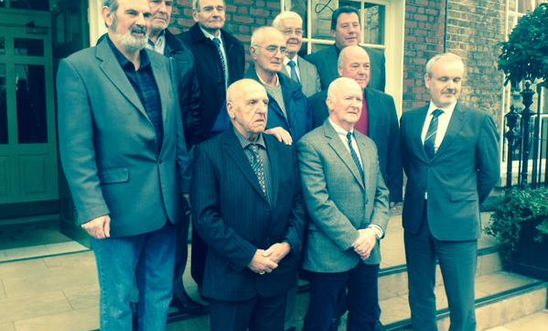
Press releases
Irish government should 'do the right thing' says Amnesty, on eve of UK torture case decision

Amnesty International has repeated its call to the Irish Government to request a re-opening of the landmark European Court of Human Rights 1978 judgement in Ireland v UK involving the torture of 14 so-called ‘hooded men’, who were interned in Northern Ireland in 1971.
The call comes on the eve of a crucial meeting of the Irish Cabinet which may decide if the government will seek a revision of the European Court's decision, in light of revelations that the UK government withheld crucial evidence from the European Court during the hearing.
Today (Monday) the Irish High Court adjourned to 3pm tomorrow an application by the ‘hooded men’ seeking to compel the Irish Government to decide on requesting the European Court of Human Rights to reopen the 1978 Ireland v UK judgement. It was adjourned to follow the Cabinet meeting tomorrow morning where the issue is due to be discussed.
Colm O’Gorman, Executive Director of Amnesty International Ireland, said:
“The decision by the High Court today serves to highlight how pivotal tomorrow’s Cabinet meeting will be. Tomorrow’s cabinet meeting is its last opportunity ahead of the December 4 deadline to do the right thing.”
“43 years after Jack Lynch’s Government took the courageous step of bringing the UK to the European Court, we are appealing to the current one to follow this through. It must not shirk its moral duty by letting this case drop.”
Patrick Corrigan, Amnesty International’s Northern Ireland Programme Director, said:
“Northern Ireland is haunted by the past because it has not been dealt with honestly. Trying to resolve the issues of the past around conference room tables without addressing the traumas still blighting lives cannot work. There can be no stable and lasting peace without truth and justice, including in this case.
“The clock has almost run down and we are calling on the Irish Government to make the morally right decision – not only for those fourteen brutalised ‘hooded men’, but for generations to come.”
ENDS
Editorial note:
In 1971, Ireland took the first inter-state case to come before the European Court of Human Rights, alleging that the UK had breached the European Convention on Human Rights (ECHR) through the torture and ill-treatment of these men by members of the British army and Royal Ulster Constabulary (RUC). The use of what Ireland - and Amnesty - considered to be torture during internment was central to what became known as the “hooded men” case.
Amnesty’s new call follows archival material uncovered by an RTÉ television programme, The Torture Files, broadcast in June, which revealed that the UK government withheld crucial evidence from the European Court during the hearing. The withheld evidence, Amnesty believes, could possibly have led to a different finding by the European Court in 1978, which ruled that the ‘five techniques’ of interrogation inflicted on the men constituted inhuman and degrading treatment in breach of Article 3 of the ECHR, but not torture.
The five techniques were hooding, stress positions, white noise, sleep deprivation and deprivation of food and water, and were combined with physical assaults and death threats to the men.
The 4 June RTÉ programme showed that files uncovered from the UK National Archives reveal that the British government knew that its core argument, that the effects of techniques used on the “hooded men” were not severe or long-lasting, was untrue. In fact it shows that the government appears to have known at the time of the severe and long-term psychological and physical effects of these ‘five techniques’, and in fact considered them as ‘torture’.
The RTÉ programme revealed previously unseen documents which showed that the UK authorities - including senior government ministers - sanctioned the use of the ‘five techniques’ in Northern Ireland, which they had also denied before the European Court.